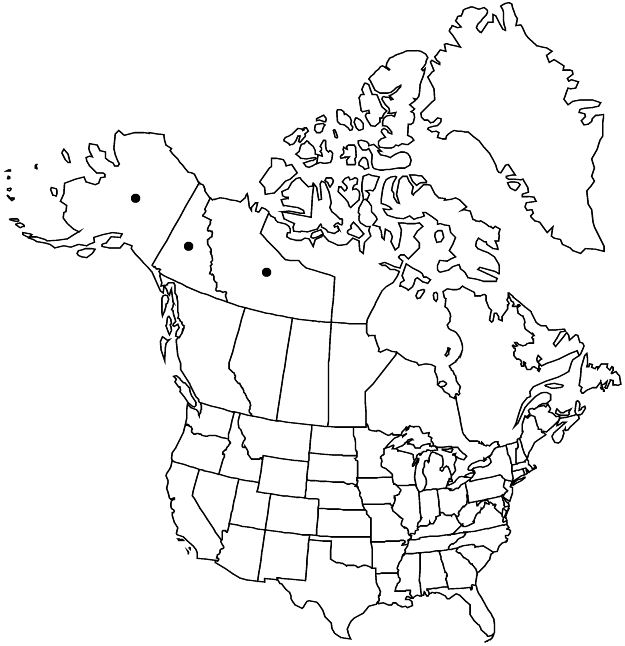Difference between revisions of "Geum glaciale"
Mém. Soc. Imp. Naturalistes Moscou 2: 187, plate 11, fig. 20. 1809.
FNA>Volume Importer |
FNA>Volume Importer |
||
| Line 12: | Line 12: | ||
|name=Novosieversia glacialis | |name=Novosieversia glacialis | ||
|authority=(Adams ex Fischer) F. Bolle | |authority=(Adams ex Fischer) F. Bolle | ||
| − | }}{{Treatment/ID/Synonym | + | }} {{Treatment/ID/Synonym |
|name=Sieversia glacialis | |name=Sieversia glacialis | ||
|authority=(Adams ex Fischer) Sprengel | |authority=(Adams ex Fischer) Sprengel | ||
| Line 30: | Line 30: | ||
|elevation=0–1400 m | |elevation=0–1400 m | ||
|distribution=N.W.T.;Yukon;Alaska;Asia (n Russia). | |distribution=N.W.T.;Yukon;Alaska;Asia (n Russia). | ||
| − | |discussion=<p>Flowers of Geum glaciale have from five to nine petals with seven being the most common. Other species of Geum nearly always have five petals, which is standard in most rosaceous genera. The sepals of G. glaciale are usually in two whorls for a total of about ten, and the bractlets are in two to three whorls. The exact number of epicalyx bractlets and sepals is made difficult to determine by the thick covering of hairs and because individual sepals and bractlets are sometimes deeply divided into two equal lobes.</p> | + | |discussion=<p>Flowers of <i>Geum glaciale</i> have from five to nine petals with seven being the most common. Other species of <i>Geum</i> nearly always have five petals, which is standard in most rosaceous genera. The sepals of <i>G. glaciale</i> are usually in two whorls for a total of about ten, and the bractlets are in two to three whorls. The exact number of epicalyx bractlets and sepals is made difficult to determine by the thick covering of hairs and because individual sepals and bractlets are sometimes deeply divided into two equal lobes.</p> |
|tables= | |tables= | ||
|references= | |references= | ||
| Line 54: | Line 54: | ||
|publication year=1809 | |publication year=1809 | ||
|special status= | |special status= | ||
| − | |source xml=https://jpend@bitbucket.org/aafc-mbb/fna-data-curation.git/src/ | + | |source xml=https://jpend@bitbucket.org/aafc-mbb/fna-data-curation.git/src/8f726806613d60c220dc4493de13607dd3150896/coarse_grained_fna_xml/V9/V9_84.xml |
|subfamily=Rosaceae subfam. Rosoideae | |subfamily=Rosaceae subfam. Rosoideae | ||
|tribe=Rosaceae tribe Colurieae | |tribe=Rosaceae tribe Colurieae | ||
Revision as of 19:19, 18 September 2019
Plants subscapose. Stems 2–30 cm, densely pilose, hairs 2–5 mm. Leaves: basal 3–10 cm, blade pinnate-pinnatifid, leaflets/lobes 11–23, terminal leaflet slightly larger; cauline 1.4–2.5 cm, stipules adnate to leaf, indistinguishable from lobes, blade bractlike, not resembling basal, alternate, simple, 3-fid. Inflorescences 1-flowered. Pedicels densely pilose, eglandular. Flowers erect; epicalyx bractlets 6–9 mm; hypanthium green; sepals spreading-erect, 7–14 mm; petals 5–9, spreading, yellow, obovate, orbiculate, or ovate, 10–20 mm, longer than sepals, apex rounded to emarginate. Fruiting tori sessile, silky. Fruiting styles wholly persistent, not geniculate-jointed, 18–30 mm, apex not hooked, pilose except distal 1–3 mm. 2n = 28.
Phenology: Flowering early summer.
Habitat: Tundra, rocky slopes, heaths
Elevation: 0–1400 m
Distribution

N.W.T., Yukon, Alaska, Asia (n Russia).
Discussion
Flowers of Geum glaciale have from five to nine petals with seven being the most common. Other species of Geum nearly always have five petals, which is standard in most rosaceous genera. The sepals of G. glaciale are usually in two whorls for a total of about ten, and the bractlets are in two to three whorls. The exact number of epicalyx bractlets and sepals is made difficult to determine by the thick covering of hairs and because individual sepals and bractlets are sometimes deeply divided into two equal lobes.
Selected References
None.